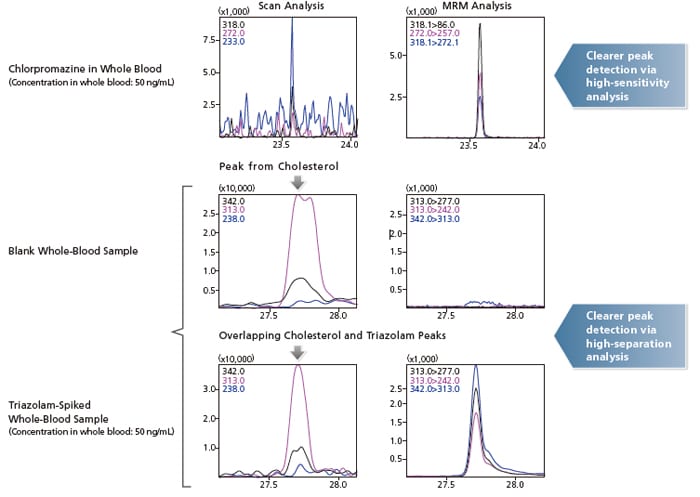Smart Forensic Database - Funzionalità
Database for GC-MS and GC-MS/MS
Supports Simultaneous Analysis Using GC-MS/MS
Smart Forensic Database is registered with information for MRM analysis of forensic toxicological substances often involved in poisonings, such as drugs of abuse, phychotropic drugs, pharmaceuticals and pesticides. The Smart Forensic Database enables simultaneous high-sensitivity analysis of approximately 480 compounds by adding information about 285 forensic toxicological substances. The database contains information on retention indices, MRM transitions, collision energies, and confirmation ion ratios, eliminating the need to configure complicated analysis conditions. Furthermore, retention indices are registered for all of the components, enabling easy updating of retention times via the AART (Automatic Adjustment of Retention Time) function.
Provides Improved Selectivity and Sensitivity via MRM
With GC-MS/MS MRM mode, mass separation is performed in two stages. As a result, background interferences from biological samples are easily separated from the target compounds, and the forensic toxicological substances are detected with improved sensitivity. Thus, it is easy to determine whether biological samples contain forensic toxicological substances, and data analysis times are substantially reduced.

Creates Optimal MRM Methods Automatically
The Smart MRM program creates MRM methods automatically. In multicomponent simultaneous analysis, it is difficult to configure the dwell, event, and loop time-measurement settings in the MRM program. Smart MRM, however, automatically determines the optimal time-measurement settings, and creates a high-sensitivity method. The MRM method is created based on the retention time information for target compounds, using the AART function.
Extensive support for creating MRM methods
Combination with the GC/MS Forensic Toxicological Database in Simultaneous Scan/MRM Measurement
Scan data obtained with simultaneous Scan/MRM measurements can be analyzed using the GC/MS Forensic Toxicological Database, which is used to screen for forensic toxicological substances. MRM data can be used for trace quantity analyses of toxicological substances often involved in poisonings, which are registered in the Smart Forensic Database, while the scan data can be used to screen for drugs of abuse using the GC/MS Forensic Toxicological Database, which includes many designer drugs.


